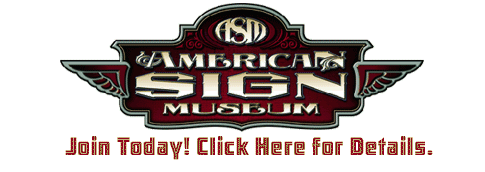|
|

Signkits & Sign-making
Equipment/Tools
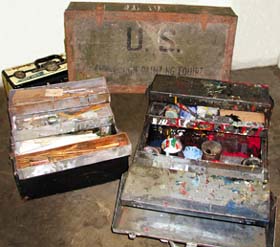
The Museum has acquired a number of other signpainting kits
for display in the permanent collection. Every kit has a story behind
it, and each lends a clue to the special techniques and specialty
work of its owner. The one in the background is a U.S. Army-issued
sign box.
The one in the foreground at left was once used by Raymond
Isherwood, a New Jersey signpainter who specialized in goldleaf. The
kit was donated by Val Hadshinow, Signs by Val, North Arlington, NJ,
who was Isherwood's understudy.
The signkit at right belonged to Albert Coonrod, Sr., whose
signpainting career spanned over 50 years before he "retired" in
1986. Coonrod's diverse career included restoration of church
statues and ceiling murals; a stint at the Mare Island Naval Yard in
California; and freelancing as a designer and artist at Christmas
Village, Waterloo, IA. Website: www.albert.howlingmoon.info
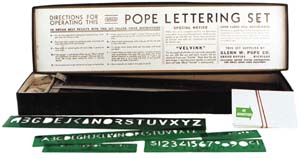
The Pope Lettering Set was
manufactured by Glenn W. Pope Co. (Grand Rapids, MI). The
kit consisted primarily of plastic stencils in various
typestyles and sizes, plus a track system for mounting the
card stock to be 'printed.'
|
The Duro Sign Maker kit
consists of gold decal letters and numbers in
various styles and fonts (including drop shades)
displayed in a metal box.
|
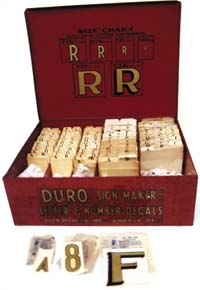
|
|

|
The Aristocrat Sign
Maker, was donated by John Smith, a retired
vice president of Cincinnati Sign Supplies Inc. A
beautiful 41/2 * 10 * 20-in. wooden box housed this
kit and included two complete font sizes, a ruler
and spacing bar, stamp pad and other accessories.
|
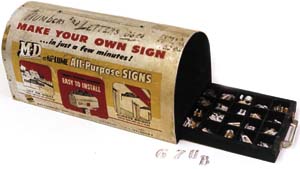
The Nu-LUME All-Purpose Signs
display was marketed by Macklanburg Duncan Co. (Oklahoma
City) and probably targeted hardware stores. The 1950s-style
graphics show three installation examples. The typical copy
reads, "Make Your Own Signs...in just a few minutes!" A
pull-out drawer built into the mailbox opening houses
individual adhesive letters.
|

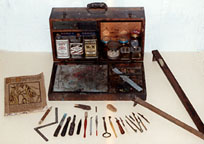
|
Bob Fitzgerald, longtime Signs
of the Times' columnist and author of the classic
book Practical Signshop Operation, donated
the signkit of his mentor, Elmo Wilson, who
passed away in 1967. Fitzgerald wrote an article
about the signkit in the May, 1983 issue of Signs
of the Times. The kit harkens back to the days when
sign painters traveled light, carrying nearly
everything they needed for a given job. Fitzgerald
also donated Mr. Wilson's "bridge", which he
fashioned to span over still wet work or extremely
hot metal, and a box of gold decal letters which he
used to "gild" windows.
|
|
Charlie Wheeler, owner of Tattoo
Charlie's in Louisville, KY, donated this signkit.
Wheeler has a great interest in signpainting
himself, and acquired the signkit of Charles W.
Stanley, a colorful character who among other
things, painted showcards and banners at
Cincinnati's former Coney Island amusement park.
Wheeler was a showman at heart, pulling off such
stunts as the first "wedding on skis" during his
tenure as Coney Island's Director of Special
Events. He also purchased the bullet-riddled car in
which Bonnie and Clyde met their demise, and was
President of the National Fast Draw (as in
gunfighter) Club of America.
|
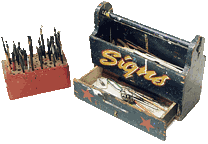
|
|

|
The "Duro Sign Maker"
lettering kit, manufactured by Duro Decal Co.,
Chicago, IL, is composed of gold and black outlined
decals of upper case letters and numerals. The
individual characters are available in six sizes,
including, 1, 1-1/2, 2, 3 and 3-1/4-in.
heights.
|
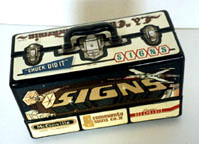 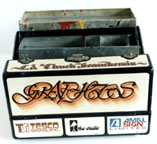
|
|
This signkit is a personal
history of the signpainting career of its donor,
Chuck Beauchemin, who retired in 1999 after
40 years. Each shop Chuck owned or worked for is
recorded on the signkit with a logo and the year
and state (or in one case, country-New Zealand)
when and where he worked. The signkit was not just
a show piece, but Chuck's everyday
signkit.
|
|
Home
| News | Exhibits
|
Links
| FAQ | Contact
Us
|
|
